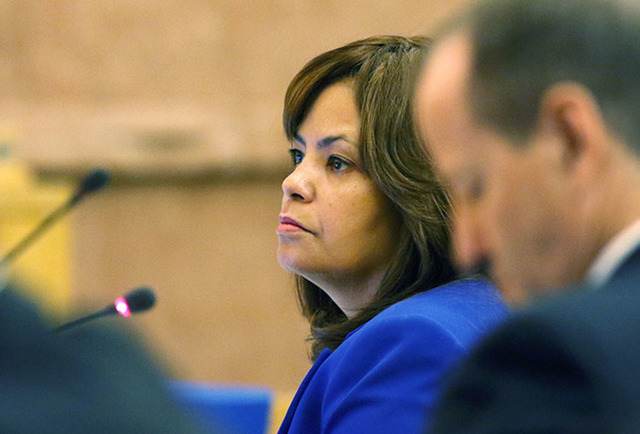Clark County priority for 2017 Nevada Legislature: Change property tax cap

What goes up must come down.
Local government officials learned that the hard way last year, when a Nevada law enacted in 2005 to protect residents from ballooning property taxes crippled county, city and school district revenue streams across the state.
The effect is lingering fallout from the Great Recession, which reversed the trend of soaring property values that had necessitated the tax increase caps in the first place.
Now, Clark County Manager Yolanda King wants her top lobbyists to persuade state lawmakers to modify the property tax cap law during the 2017 Nevada Legislature session that begins Feb. 6.
“We’re seeing an increased level of services needed from our taxpayers, but the (property tax) revenue that is used to provide those services to the taxpayers isn’t keeping up,” said King, who is also the county’s former chief financial officer.
County and city governments across Nevada hope Assembly Bill 43 will fix the formula that caused property tax increases to plummet last year, even though assessed property values have been steadily climbing, King said.
“It affects urban, rural, north and south,” said Jeff Fontaine, executive director of the Nevada Association of Counties, which requested the bill. “Our intent is to provide more stability to the property tax revenues, so that the counties can budget and provide the services that their constituents expect. This isn’t about creating a windfall for county governments.”
AB43 will not remove existing stationary caps on annual increases of residential and commercial property taxes, which are set at 3 and 8 percent, respectively. Instead, it would establish a floor of 3 percent for the annual commercial property tax increase.
That’s important, King said, because the formulas used to calculate commercial property tax increases resulted in an increase of 0.2 percent for the 2017 fiscal year. A provision of the law also meant residential property taxes were limited to rising by 0.2 percent.
Fontaine said six counties, including Clark and Washoe, saw property taxes increase by only 0.2 percent last year because of those formulas. Another three counties had increases below 3 percent.
Those numbers were caused by two secondary caps that are part of the law.
The first is a 10-year average for the growth rate of taxable home value. That’s been in decline since 2008 and is expected to be in the negatives through at least 2017 thanks to the Great Recession.
The 0.2 percent increase in 2016 was calculated by doubling the previous year’s Consumer Price Index, a formula used to measure inflation on a national level. Since it’s the larger number of the two secondary caps, it was the 2017 fiscal year’s acting cap.
In addition to establishing a floor for property tax increases, AB43 aims to change the formula in the tax cap law involving the CPI to make it easier to predict annual increases, King said. The bill would change the CPI used from a single year to a 10-year rolling average.
If that formula were already in effect for fiscal year 2017, King said, commercial property tax would have risen 4 percent, and residential property tax would have risen 3 percent.
“AB43 will hopefully smooth out what the CPI percentages look like over a period of time, rather than at one point of time,” King said. “You will and can avoid the fluctuations in what you will pay from year to year.”
In addition to AB43, a team of three Clark County employees is preparing to lobby for two more bills requested by the county, both of which the county submitted to the Legislative Counsel Bureau last year.
Senate Bill 9 is intended to help reduce overcrowding at the county jail.
Assembly Bill 65 would free up $15 million to $20 million a year in the county’s general fund and provide University Medical Center with close to $10 million a year in capital via a reallocation of property tax revenue, King said.
The county’s team includes lead lobbyist Alex Ortiz, the county’s assistant director of administrative services; office of risk management director Les Lee Shell; and coroner John Fudenberg.
Shell and Fudenberg have each lobbied at one other Nevada Legislature session, King said. Ortiz has lobbied at more than six.
Contact Michael Scott Davidson at sdavidson@reviewjournal.com or 702-477-3861. Follow @davidsonlvrj on Twitter.
CLARK COUNTY LEGISLATIVE PRIORITIES
Senate Bill 9 would allow Nevada counties to request responsibility for creating Presentence Investigation Reports, documents that provide judges with sentencing recommendations for people convicted of felony or gross misdemeanor crimes.
Right now counties pay 70 percent of the cost to create the reports, but the Nevada Department of Public Safety is in charge of making the reports. The state agency’s average completion time on the reports is slower than the 45 days allowed by state law.
Clark County can complete the reports faster and speed up the process of getting convicts out of the county jail, County Manager Yolanda King said.
Assembly Bill 65 would allow the county to use property tax revenue set aside for its indigent assistance fund to make payments to Medicaid’s Upper Payment Limit program, which would be matched by the federal government and come back to University Medical Center, a public hospital.
Doing so would free up $15 million to $20 million a year in the county’s general fund, where the payments to the UPL come from, King said.
AB 65 also would allot a portion of property tax revenue to be used for renovation and expansion projects at UMC.
As written, that amount is up to 2 cents of a property’s tax rate. King said that would amount to close $10 million a year.
graphic












